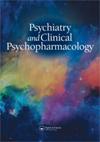Psychometric properties of the Turkish version of the Thought-Action Fusion-Child Version (TAFIC)
IF 0.5
4区 医学
Q4 PHARMACOLOGY & PHARMACY
引用次数: 0
Abstract
OBJECTIVE: The concept of thought-action fusion has long been recognized as a cognitive vulnerability factor for psyhopathology that given its clinical relevance and importance reliable assessment of this phenomenon seems to be essential. The aim of this study was to investigate the psychometric properties of the Thought-Action Fusion Inventory for Children (TAFIC) among Turkish children and adolescents. METHODS: Five hundred and ninety-one subjects (mean age=14.16±2.08 years) participated in the study. Voluntered subjects completed the TAFIC, Magical Ideation Scale (MIS), Child Depression Inventory (CDI), Screen for Child Anxiety Related Emotional Disorders RevisedChild Self-Report (SCARED-R-CV), and Metacognitions Questionnaire for Children (MCQ-C). RESULTS: Confirmatory factor analysis revealed the original four-factor structure excellently fit the data on the Turkish version of the TAFIC. Internal reliability of the instrument was acceptable to excellent, with Kuder-Richardson coefficients ranging from 0.70 to 0.89. The convergent validity of the TAFIC was adequate, with significant correlation coefficients with magical ideation, meta-cognitions, depression, and anxiety related emotional problems. CONCLUSIONS: Based on these findings, we concluded that the Turkish version of the TAFIC has promising psychometric properties in assessing thought-action fusion among children and adolescents.土耳其版思想-行动融合-儿童版(TAFIC)的心理测量特性
目的:思想-行动融合的概念长期以来被认为是精神病理学的认知脆弱性因素,鉴于其临床相关性和重要性,对这一现象进行可靠的评估似乎是必不可少的。本研究的目的是探讨土耳其儿童和青少年的思想-行动融合量表(TAFIC)的心理测量特性。方法:591名受试者(平均年龄=14.16±2.08岁)参与研究。志愿者完成了TAFIC、魔幻思维量表(MIS)、儿童抑郁量表(CDI)、儿童焦虑相关情绪障碍筛查-儿童自我报告(SCARED-R-CV)和儿童元认知问卷(MCQ-C)。结果:验证性因子分析显示,原始的四因子结构与土耳其版TAFIC的数据非常吻合。仪器的内部信度可接受至优秀,库德-理查森系数范围为0.70至0.89。TAFIC的收敛效度较好,与神奇意念、元认知、抑郁、焦虑相关情绪问题有显著的相关系数。结论:基于这些发现,我们得出结论,土耳其版本的TAFIC在评估儿童和青少年的思想-行动融合方面具有很好的心理测量特性。
本文章由计算机程序翻译,如有差异,请以英文原文为准。
求助全文
约1分钟内获得全文
求助全文
来源期刊

Psychiatry and Clinical Psychopharmacology
Medicine-Psychiatry and Mental Health
CiteScore
1.00
自引率
14.30%
发文量
0
期刊介绍:
Psychiatry and Clinical Psychopharmacology aims to reach a national and international audience and will accept submissions from authors worldwide. It gives high priority to original studies of interest to clinicians and scientists in applied and basic neurosciences and related disciplines. Psychiatry and Clinical Psychopharmacology publishes high quality research targeted to specialists, residents and scientists in psychiatry, psychology, neurology, pharmacology, molecular biology, genetics, physiology, neurochemistry, and related sciences.
 求助内容:
求助内容: 应助结果提醒方式:
应助结果提醒方式:


